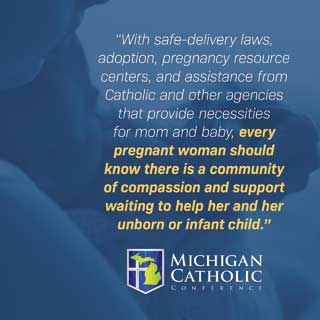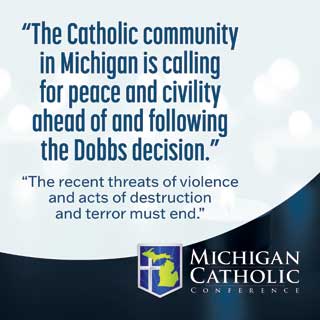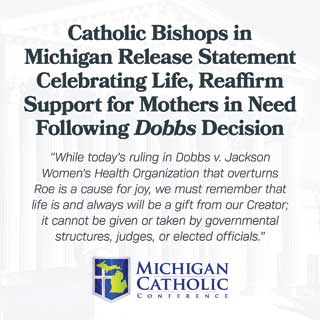Lansing Update: Bishops Respond to Roe Overturned and more…
Posted June 24, 2022
In this report:
- Catholic Bishops in Michigan Release Statement Celebrating Life, Reaffirm Support for Mothers in Need Following Dobbs Decision
- MCC Urges Peace and Civility in Wake of Supreme Court Ruling in Dobbs Case
- U.S. Bishops Support Gun Reform Bill Approved By Congress
- Supreme Court Ruling Sets Stage for More Education Choice Nationwide
- Adoption Reform Package Advances in Senate
- Reflecting on Religious Freedom Week & Freedom to Serve the Common Good
Following today’s momentous and historic ruling from the Supreme Court of the United States in Dobbs v. Jackson Women’s Health Organization that overturns the 1973 Roe v. Wade decision — which to this day has resulted in the tragic loss of some 63 million unborn children nationally and more than 1.5 million children in Michigan — the eleven Catholic bishops in the state of Michigan have released a joint statement that expresses joy with the Court’s majority opinion while reaffirming the Catholic Church’s compassion and support for mothers in need.
In their statement, the bishops proclaim that life is a God-given right while reaffirming the Catholic Church’s commitment to support mothers during and after their pregnancies. They further clarify that the work to build up a culture of life must continue, particularly considering efforts to impose unregulated abortion in Michigan and across the country have already begun.
Catholic Bishops in Michigan Statement Following Dobbs Decision
Nearly fifty years after the unjust decision in Roe v. Wade, our country draws closer to a society that recognizes the God-given right of life for all persons, at any stage or in any condition. While today’s ruling in Dobbs v. Jackson Women’s Health Organization that overturns Roe is a cause for joy, we must remember that life is and always will be a gift from our Creator; it cannot be given or taken by governmental structures, judges, or elected officials.
We are saddened by the fear and anger that has reverberated across our land since a draft of this opinion was leaked to the public. In light of these concerns, we wish to make clear that no woman should face pregnancy alone. With safe-delivery laws, adoption, pregnancy resource centers, and assistance from Catholic and other agencies that provide necessities for mom and baby, every pregnant woman should know there is a community of compassion and support waiting to help her and her unborn or infant child. We empathize with women who struggle with daily challenges that may affect their decision to carry their baby to term: financial insecurity, food insecurity, medical care, lack of relationship and/or family support, coercion, and homelessness, just to name a few.
The pro-life movement must redouble its efforts to ensure every woman has the support she needs throughout her pregnancy and beyond, whether she chooses to parent or create an adoption plan. We affirm that the Church must prioritize this work, through our Catholic Charities and parish-based support networks, to meet the physical needs of mothers and children as well as offer the emotional support and love new mothers need. We also implore men to be respectful of women and responsible when they father a child. We are all called to walk with moms in need, and we encourage all Michiganders to join us in this effort.
Today’s momentous decision would not have occurred without fifty years of prayer, action and witness from innumerable women and men who promote the sanctity of human life. These people of goodwill laid the foundation for a future of love, compassion, and support toward women and their unborn or newborn children. Though Roe is no longer relevant to abortion policy, we must remain vigilant against future attempts to promote abortion as help for women, which in reality are attacks on human life itself. Some of those attacks have already started here in Michigan through the legislative process, at the ballot box and in the court room, signaling that the work to build up a social order that respects human life is not finished.
Let us, as the Body of Christ here on Earth, pray for all pregnant women and continue to proclaim that human life is sacred from conception to natural death and at every point in between, and to commit ourselves to building a society grounded in that essential God-given right.
- Most Rev. Allen H. Vigneron
Archbishop of Detroit- Most Rev. Earl A. Boyea
Bishop of Lansing- Most Rev. Paul J. Bradley
Bishop of Kalamazoo- Most Rev. John F. Doerfler
Bishop of Marquette- Most Rev. Robert D. Gruss
Bishop of Saginaw- Most Rev. David J. Walkowiak
Bishop of Grand Rapids- Most Rev. Jeffrey J. Walsh
Bishop of Gaylord- Most Rev. Gerard W. Battersby
Auxiliary Bishop of Detroit- Most Rev. Arturo Cepeda
Auxiliary Bishop of Detroit- Most Rev. Robert J. Fisher
Auxiliary Bishop of Detroit- Most Rev. Donald F. Hanchon
Auxiliary Bishop of Detroit

It should be noted that while abortion regulation returns to the states, and Michigan has a law on the books banning abortion except in cases to save the mother’s life, that law was blocked from enforcement by a state judge as a result of a lawsuit filed by Planned Parenthood.
Michigan Catholic Conference (MCC), along with Right to Life of Michigan, is fighting that lawsuit to preserve Michigan law that bans abortion and protects the unborn.
MCC Urges Peace and Civility in Wake of Supreme Court Ruling in Dobbs Case
Before the Dobbs ruling issued today, MCC this week issued a statement urging state authorities and elected officials from both parties to take note of recent violence toward religious communities and pro-life organizations.
The statement came as extremist organizations promote violence and riots if the U.S. Supreme Court overturns Roe v. Wade as part of its decision in the Dobbs case, which the Supreme Court ended up doing.

“The Catholic community in Michigan is calling for peace and civility ahead of and following the Dobbs decision,” said MCC President and CEO Paul A. Long in the statement issued Thursday. “State and local authorities should be on alert and ready to protect individuals and property should violence or acts of terror occur before and following release of the Dobbs ruling. We believe it is possible that extremist or incendiary responses from lawmakers or advocacy groups to a decision that overturns Roe will only incite violence and destruction, perhaps even the loss of life.”
Since February 2022, extremists and violent organizations have begun to commit acts of destruction and are calling for more violence. Both nationally and in the state of Michigan, those include:
- Following the leak of the draft opinion in Dobbs, a group called ‘Ruth Sent Us’ encouraged disruption of church services on Mother’s Day across the country and went so far as to publish online the location of a school attended by a U.S. Supreme Court justice’s children.
- Earlier this month, a man was arrested after alerting authorities that he had intended to assassinate a U.S. Supreme Court justice. The man referenced the impending Dobbs decision.
- On June 20, the Wall Street Journal editorial board wrote that a group called ‘Jane’s Revenge’ called for a “night of rage,” and has stated “if abortions aren’t safe, you aren’t either.”
- News reports from June 22 indicate that pro-abortion organizations targeted for violence two pregnancy resource centers in Michigan, one in Dearborn Heights and the other in Redford.
- A U.S. congressman from Michigan reported, also on June 22, that his office and a neighboring pro-life center were also vandalized, with doors being smashed and windows broken.
- A Catholic Church in New York City reported it received a threat to bomb and burn down the church after the draft opinion in Dobbs was leaked.
MCC is appreciative of comments from Governor Whitmer in May 2020, when the governor used her office to encourage peace and condemn violence amid an unsettling time in the state.
According to Michigan Radio, the governor said: “But it is the threat of violence that is beyond the pale, that is unacceptable, that is undemocratic, that is un-American, frankly. We all have our right to speech, but none of us has the right to endanger other people. Because it would be a terrible travesty if someone got hurt in this already tough, stressful moment in our state and in our nation.”
“The recent threats of violence and acts of destruction and terror must end,” Long said. “We are calling for local and state authorities to be attentive to these threats and to ensure all people remain safe and protected. We also encourage elected officials to condemn specifically and discourage violent acts, as officials on both sides of the aisle have a role to play and should be mindful of how their words and comments can lead either to peace or violence.”
MCC’s statement comes after the U.S. Conference of Catholic Bishops (USCCB) made a similar plea for peace, noting that since the release of the draft opinion in the Dobbs case, “charities that support pregnant mothers in need have been firebombed, and pro-life organizations have been attacked almost daily and terrorized, and even the lives of Supreme Court justices have been directly threatened.”
Last week, MCC reported on House Resolution 317, which formally condemns the attacks on pregnancy centers that have taken place across the nation. The resolution, sponsored by Rep. Andrew Fink (R-Hillsdale), was referred to the House Health Policy Committee for further consideration.U.S. Bishops Support Gun Reform Bill Approved By Congress
The USCCB is backing a bipartisan gun safety bill that has now cleared both chambers of Congress.
The Bipartisan Safer Communities Act came about because of bipartisan negotiations in the U.S. Senate that included Michigan Sen. Debbie Stabenow. According to the USCCB in a letter to lawmakers, the bill would:
- Strengthen state crisis intervention programs, including extreme risk protection order programs
- Provide funding to help schools prevent violence, including mental health initiatives, and access to equitable services for non-public schools
- Strengthen background checks and protect victims of domestic violence
- Clarify the definition of a firearm dealer to make it more difficult to evade licensing and background check requirements.
- Enhance reviews of gun purchasers under the age of 21
- Address weapons trafficking
- Invest in children and family mental health services
The bill has already cleared the Senate and passed the House today, and media reports indicate President Joe Biden will sign it into law.
In addition to writing to Congress, USCCB had invited members of the public to reach to their congressional representative to support the bill.
Supreme Court Ruling Sets Stage for More Education Choice Nationwide
The U.S. Supreme Court this week issued an important ruling that could help pave the way for more education choice in Michigan.
The court ruled in the Carson v. Makin case that the State of Maine’s refusal to provide funds for students to attend schools that provide religious instruction violates the Constitution. According to the ruling, the state must allow for students to use funds at religious schools because the state provides funds for students to attend private, non-religious schools.
The idea is that if the state provides funds to secular private schools, it must also provide funds to religious private schools.
In response to the ruling, MCC stated that “a wide range of educational options should be encouraged by the state and federal government, without penalty for those families who choose a nongovernmental school for their children” and reiterated that Michigan continues to be “one of the few states remaining with severe and discriminatory constitutional restrictions against educational choice, particularly aid to nonpublic schools.”
Michigan’s education policy is still very much impacted by 19th Century U.S. Rep. James Blaine, whose anti-Catholic views were successful in preventing the use of public funds for Catholic schools in states across the country.
Article 8, Sec. 2 of the Michigan Constitution — otherwise known as a “Blaine Amendment” — prohibits the state from enacting policies such as vouchers, tax credits, or scholarship programs.
But in recent years, numerous states across the country together with a growing number of decisions from the U.S. Supreme Court have found that state aid to religious schools is constitutional, with the effect of enhancing educational outcomes and opportunities for millions of primarily low-income children.
“While today’s ruling requires further examination for any potential impact on this state, it does bring us closer to the day when families in all 50 states have access to full educational choice,” MCC said in its statement this week.
Other responses to the Carson case this week included:
- “The Court has again affirmed that states cannot exclude religious schools from generally-available public benefits based on their religious affiliation or exercise” —U.S. Conference of Catholic Bishops (USCCB)
- “Today’s ruling is a great victory for parents — not just in Maine but across the country — who want to be able to choose what kind of education their children receive, including a religious education. It is also another important blow against state Blaine amendments, which were born out of very ugly anti-Catholic and anti-immigrant bigotry and now appear to be on life support, a long overdue development” —Council for American Private Education
- “This is a thunderclap for education freedom” —American Federation for Children
Adoption Reform Package Advances in Senate
A legislative package intended to improve the foster care and adoption process in Michigan advanced from a Senate committee to the Senate floor this week.
The package of bills — many of which are supported by MCC — was developed following recommendations issued by a bipartisan task force on how to improve the child welfare system and the adoption process. The legislation cleared the Senate Health Policy and Human Services Committee and is now on the Senate floor for action, after having already cleared the House.
To read about the bills MCC supports, click or tap here.
Reflecting on Religious Freedom Week & Freedom to Serve the Common Good
The week of June 22 to 29 is commemorated as Religious Freedom Week in the U.S.
Americans are called to pray, reflect, and act on promoting religious freedom, according to the USCCB, noting that religious freedom allows the Church and all religious communities to live out their faith in public and to serve the good of all.
The USCCB is offering a prayer intention each day of the week related to religious freedom. Those intentions and more information can be found here.
Religious liberty also involves the freedom for religious organizations to serve according to their religious beliefs. Based on that essential advocacy principle, MCC advocates for the freedom for faith-based providers, institutions, and all individuals to serve the general public according to their religious tradition and without interference from the government.
MCC also opposes government regulations and mandates that violate the long-standing religious practices of faith-based organizations. For examples of MCC’s advocacy for religious liberty and the freedom to serve, click or tap here.

